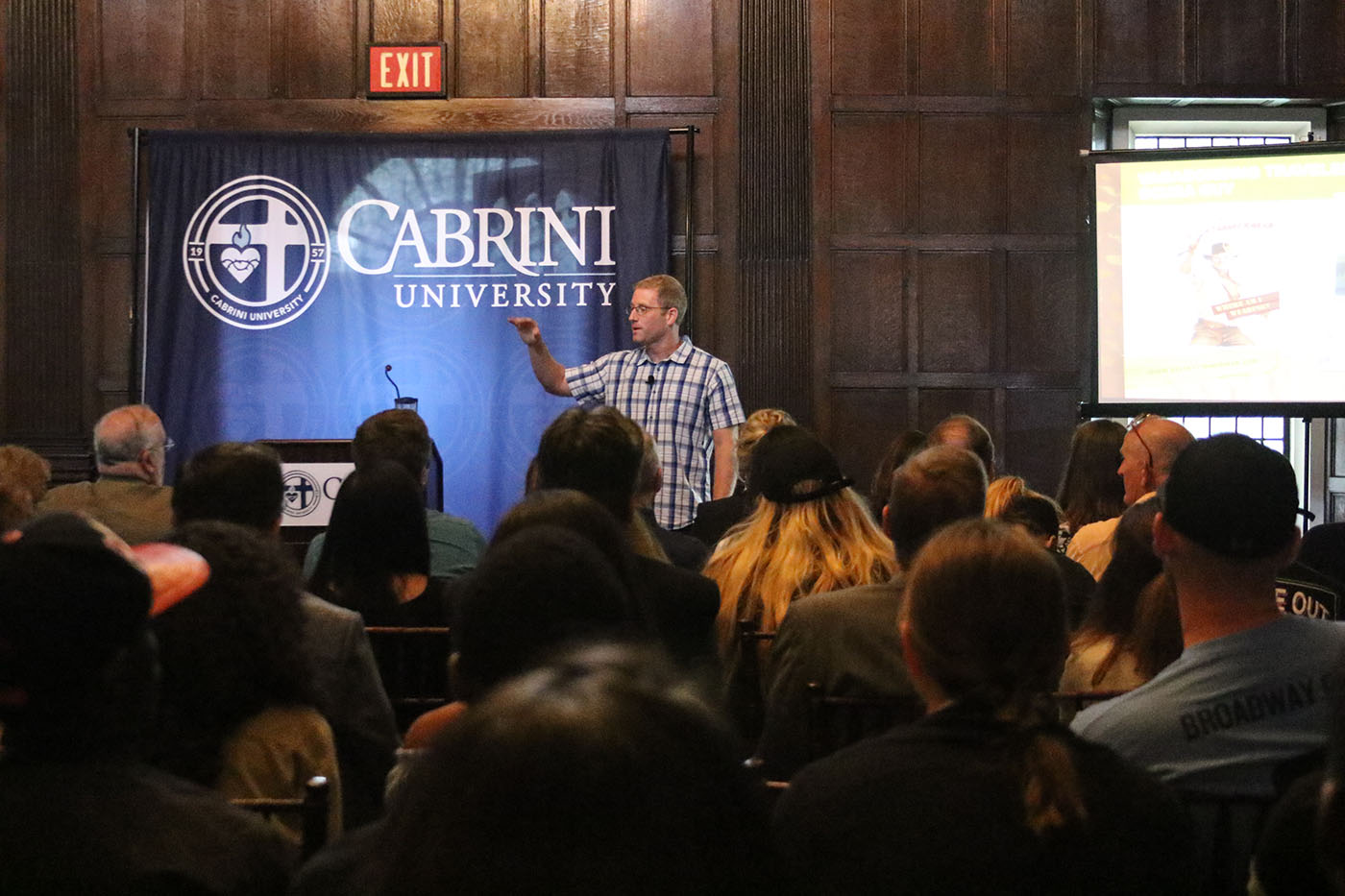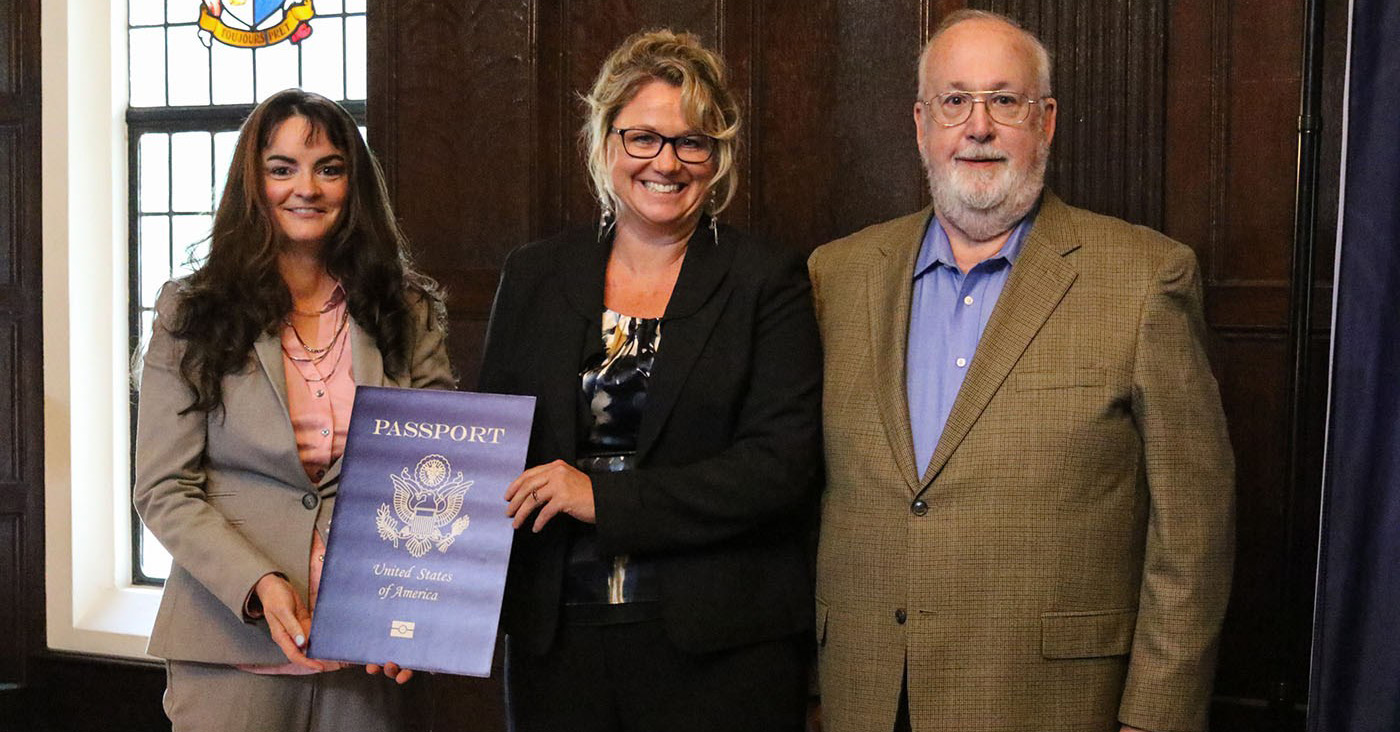On Monday, Sept. 18, Cabrini hosted a ceremonial launch for its Center for Global Learning, one of the first events of the GlobalPhilly 2017 Showcase—a 45-day international exposition.
“The mission of the Center is to serve as a resource to build cultural awareness … to build responsible global citizenship … and for equipping students with intercultural understanding and global awareness through a social justice lens,” said Erin McLaughlin, PhD, Center Co-Director.
“The Center will also serve as a resource to build partnerships … and for research and scholarship for students, staff, faculty, other institutions, and organizations.”
A part of Cabrini’s School of Business, Arts, and Media, the Center is already serving as the foundation for a number of initiatives in support of its mission. The Center touts faculty affiliates—key contributors to the Center who lend their expertise in the areas of grants, proposal development, and faculty development, and who serve on Center-sponsored panels, collaborate on research projects, and help with policy analyses.
The Center support has also resulted in Cabrini’s first Study Abroad Fair, which will be held Oct. 26 (3-5pm, Grace Hall Atrium), during which students from across Cabrini’s four schools will present their international experiences.
“The opening of the Center for Global Learning reaffirms Cabrini’s commitment to developing well-educated, global citizens who exemplify leadership and a commitment to social justice,” said Chelsea DiPompeo (’18), a double major in International Business and Accounting. “So what does it mean to be a well-educated, global citizen? To me, it means embracing diversity and different perspectives, acknowledging my role and the role of others in global current events, and accepting my responsibility in collaborating to build a sustainable world community.”
“I find as I travel that I’m enjoying the differences I see around the world, but I’m also enjoying this common bond we have as people and how it reflects in our values,” said John Heiberger, Professor Emeritus, encouraging students to take advantage of the opportunities to travel. “We’re all trying to make the world a little better.”
Heiberger officially launched the Center, handing a large symbolic passport to the Center’s Co-Directors, McLaughlin and Vonya Womack. “For all the support you’ve given to our students and our faculty for our global initiatives, we wanted you to be the one to officially launch the Center,” said Mary Van Brunt, PhD, Dean of the School of Business, Arts, and Media, who emceed the event.
The event also featured keynote speaker Kelsey Timmerman, journalist, traveler, and author of Where Am I Wearing?, Where Am I Eating?, and the forthcoming (spring 2018) Where Am I Giving?
“For the past decade, I’ve traveled to the countries of origin to meet the people who make many of the things in our lives that we take for granted, from the clothes that we wear, to the food that we eat,” said Timmerman.
“So many of the lessons I learned in college really didn’t hit home until I had experiences out in the world. … I came from a place that was not diverse whatsoever, and to learn how other people live around the world was pretty amazing.”
Committing his first “really random act of travel,” Timmerman decided to travel to Honduras, where a shirt of his was made. He showed up at the factory wearing the shirt, but the factory owner denied Timmerman’s request for a tour. He ended up waiting for workers on the side of the factory so he could speak to them, ask them questions, and really listen to the answers.
“It was the first time I faced my own privilege,” said Timmerman.
Through his experiences, Timmerman has met and researched people all over the world, sharing their stories and perspectives in his books.
“Ask yourself,” said Timmerman, “’Is it exploitation or is it opportunity?’”

Timmerman spoke of Reshma Begum, a Bangladesh garment worker who heeded the call to “Leave the farm, go work in the factory,” and who survived 17 days in the wreckage of the factory that collapsed around her. The factory had been inspected the night before after people expressed concerns, but was deemed safe. The collapse killed 1,133 people. Begum was the last survivor pulled from the wreckage. A working mom with three kids, she had been working there for $24 per month; it takes $15 a month to feed a family of four. “She was pursuing an opportunity that literally collapsed around her,” said Timmerman.
Timmerman also spoke of Solo, a Ghanian farmer whom Timmerman met while visiting a cocoa farm in Ivory Coast. The farm’s owner set Timmerman up with Solo because Solo was the only worker who spoke English. Timmerman learned that Solo works on the farm, six hours per day, but won’t get paid until he works for one year. “The donkeys are treated better,” said Solo. “They get fed when they aren’t working.” Solo calls the farm’s owner “master.”
“Solo is a slave,” said Timmerman. “By definition, by International Labor Organization standards, his reality is that he is not a free man.”
Timmerman managed to hire Solo as a translator, taking him off the farm and paying him $40. Provided with the means to do so, Solo wanted to go home to Ghana and go back to school, he told Timmerman. After a failed attempt to contact his brother, Solo left Timmerman to use the facilities. “Wait for me,” Solo said.
Timmerman waited and waited. Solo never returned.
Timmerman received a text from the farm’s owner: “If you go with Solo to Ghana, I will have you arrested.” Timmerman eventually returned to his hotel room and “just shook. I shook with fear for the reality of this young man.”
A few days later, Timmerman found out Solo was back at the farm—whether he was forced to go back or whether he went back of his own volition, Timmerman will never know.
“Every day, we’re connected with individuals like Solo—people that make our clothes, that grow the food that we eat. And what do we do? How can we consume in a way that’s more responsible?
“Consume one thing a day that you know provides someone else with a genuine opportunity. The biggest way it makes an impact is not within that purchase, but it’s a moment for you to stop and reflect: Where did this come from? Who did this come from? What could this possibly mean to their family? It may not change the world in that moment, but it changes the way you see the world.
“When you graduate from here, you’ll be more educated than 95 percent of the rest of the world. I think that certainly comes with some responsibility. … You can hear these stories and you can feel guilty about it, but I don’t think guilt is all that useful. I think you should only feel guilty for not fully exploiting the opportunities before us, that have been given to us. It’s up to us to make a positive difference. We need to be more than consumers, we need to be producers. What are we going to produce with our talents, our skills, our life experiences, our education?
“What will your impact be?”
